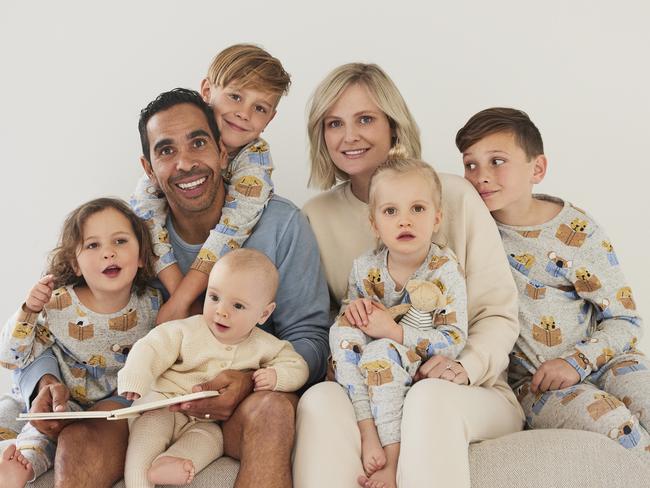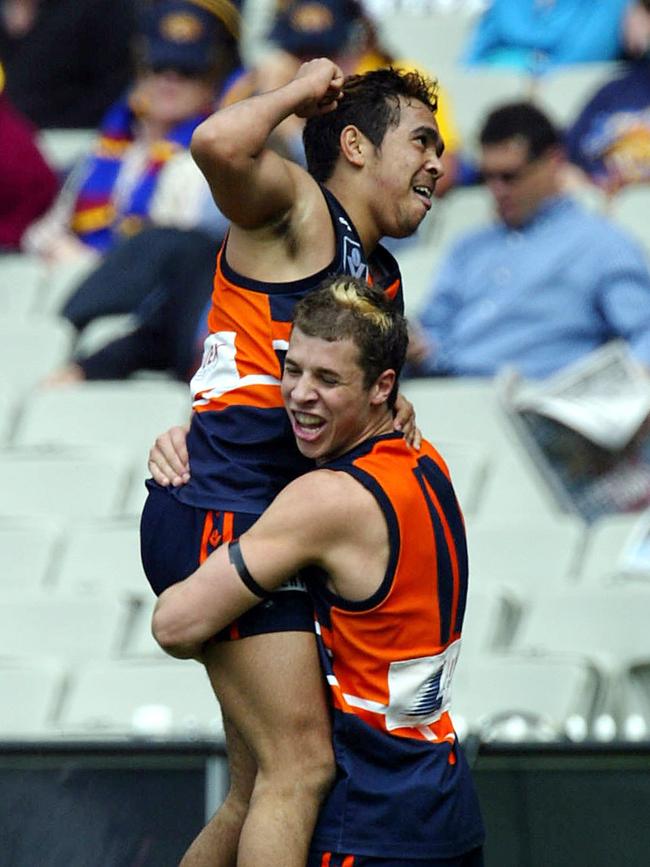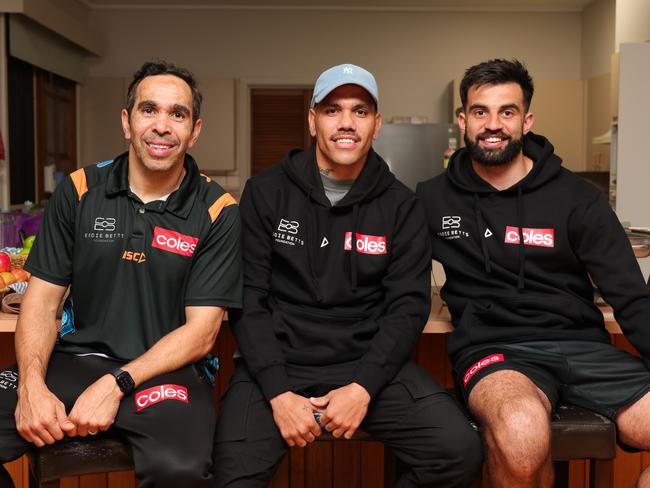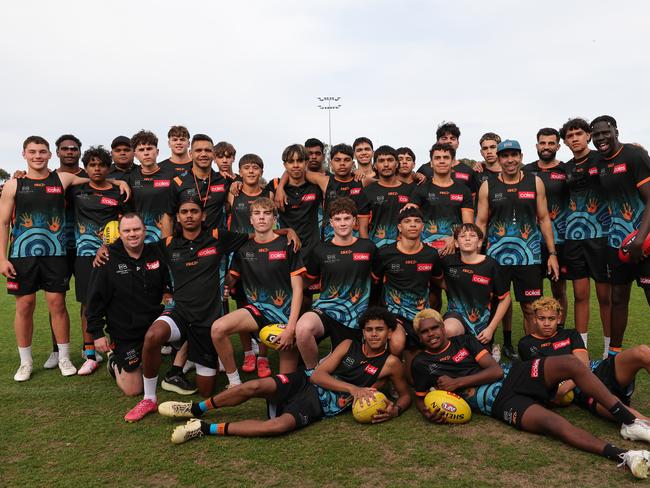How Eddie Betts Foundation is giving young Indigenous footballers a chance to shine in Melbourne
Plenty have tried to reverse the decline in the number of Indigenous players in the AFL. Now, one of the game’s greatest talents thinks he’s come up with a long-term solution.
AFL
Don't miss out on the headlines from AFL. Followed categories will be added to My News.
As football continues to fall short in reversing the established trend of dwindling numbers of Indigenous numbers on AFL lists, one of the game’s greatest Indigenous players, Eddie Betts, believes he has found a new way forward.
The Eddie Betts Foundation, founded by the 350-game Carlton and Adelaide champion and wife Anna Scullie, has helped five players from rural Western Australia and South Australia into the Victorian Coates League talent system this year.
Bottom ager Boyden George and top-age pair, goalsneak Leo Gilla and defender Shaquarn Cox, have each come from WA to join the Oakleigh Chargers’ under-18 list this year.
Gary Lawford, initially from WA and more recently Northern Territory, began on the Oakleigh under-16 list this season and has been one of 13 players bumped up to the under-18 squad.
And Queenslander Oscar Fatnowna is with the Geelong Falcons under-16 team, having had family ties to the Geelong region.
Recruiting figures have long bemoaned potential Indigenous talent doesn’t get the chance to play in front of club recruiters as the numbers on AFL lists have steadily dropped, from 87 in 2020 to 62 on lists currently, a 29 per cent fall in five years.

Given the slow march downwards of AFL Indigenous players, the five added into the talent system that likely wouldn’t have landed there before, is a start to reverse that trend.
Betts retired from the Blues in 2021 and has seen the Indigenous numbers in game have tumbled, and he believes scouts could be more “culturally responsible” and look for the positives and “thinking about Indigenous kids from a strength-based perspective rather than ‘What’s wrong with them?’”.
“I am trying to get recruiters and people to think about Indigenous kids in a way that is more like, ‘Hey this kid is really talented, what can we do to support their journey and give them an opportunity’,” he told this masthead.


Players from the foundation were given the chance to play in an Oakleigh trial game in mid-2024, with George and Cox among those impressing and earning the chance to tackle a pre-season with the Chargers.
Others in the foundation’s academy will get the chance to impress next Sunday, when they play in a curtain raiser on the Adelaide Oval before Adelaide hosts West Coast in an AFL match.
The Chargers have a strong contingent of club-aligned Indigenous talent with next generation academy prospects Jack Ison (Carlton), Mingara Clark (Carlton), Ricky Hobson (Collingwood), Tom Phillips (Fremantle) and Essendon father-son chance Alijah Davey on the list already.
But Oakleigh coach Ash Close said Gilla, Gox, George and Lawford all provided a different perspective for the playing group.
“This is probably one of the funnest parts of my job, I love coaching all the talent but coaching those who potentially haven’t had the opportunities of others in this region, that is the stuff that makes you feel warm and fuzzy when you see them develop and grow so,” he said.
“There was the initial shyness of joining a new group and not knowing anyone but I hope they feel really welcome because we certainly love them.”

Betts began his great football story in Kalgoorlie in regional WA and has picked out geography and money as two other factors holding back the discovery and development of some young Indigenous talent.
“Young Indigenous kids outside of metro areas face geography issues,” he said.
“They don’t generally get access to coaching and high performance programs that kids in the city get. School footy plays a huge role in developing kids, which ties hand-in-hand with young people accessing consistent education as well.”
Built from Betts’ experience coming from the country to Melbourne as a teenager, his foundation developed the program to help youngsters get in front of AFL recruiters and into Melbourne private schools, where the vast majority of AFL players are drafted.
The kids invariably start their Victorian time at the Betts’ family household, where Betts and Scullie split the cooking for the five children of their own and whoever else is staying in.
The players in the Betts academy are chosen through detailed footy camps, with leadership a priority, before being helped along to bridge the gap with others on a playing field above them.

Current day AFL stars have jumped on to help, with Michael Walters, Tyson Stengle, Wayne Milera, Willie Rioli and Shai Bolton among those to pop up at a community clinic or training session.
When the youngsters are identified, the foundation gets to work with his community to figure out how many steps are needed to jump up to the playing field of other draft prospects.
The gap is estimated to be about $78,000 per year, when taking in school fees, strength and conditioning coaching and other costs.
The foundation is supported by behemoth AFL sponsors Coles and Toyota, but while the AFL approves of the work, hasn’t dug in to truly back it just yet.
There is a bulging list of young Indigenous talent hoping to be guided by the foundation and ongoing funding is needed.
That monetary gap was evident in Betts’ early days in Melbourne, when he was forced to jump ticket barriers at train stations because he couldn’t afford a ticket.
“To get these kids on the same playing field, they need to be in the same systems that kids are being drafted from, where they can learn their craft and get that professional standard from an earlier age,” he said.
“We have put in place a team with strong knowledge of the footy systems that are able to advocate for the young people in the academy and ask the right questions or get an understanding of what needs to be put in place to support their goals.
“We know Indigenous kids are born leaders, they grow up in big families and communities, they are resilient, we believe they already have the attitude of what it takes, we just step in to support.
“That seems a very simple formula, and it probably is more complex than this, but when I break it down to the simplest form, that’s why I feel it works.”
George has already clearly shown that leadership, having been named an ‘emerging leader’ and thrown into Oakleigh’s leadership group despite being a bottom age player.
“He has Oakleigh captain written all over him at this stage, he is going really well,” Close said.
Of course, not all players that go through the foundation will make it onto AFL lists, but education is seen as a priority for those that are taken in.
Close was surprised recently to step out of his Northcote home – virtually on the opposite side of Melbourne to the Oakleigh region – and see Gilla and Cox going past, on their way to a TAFE course.
“I think we can see growth in this because everyone is pulling in the right direction,” Close said.
“We want to see more Indigenous and multicultural kids in the talent pathway and at Oakleigh we are really, really open to that and providing those opportunities.”




